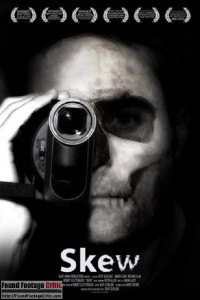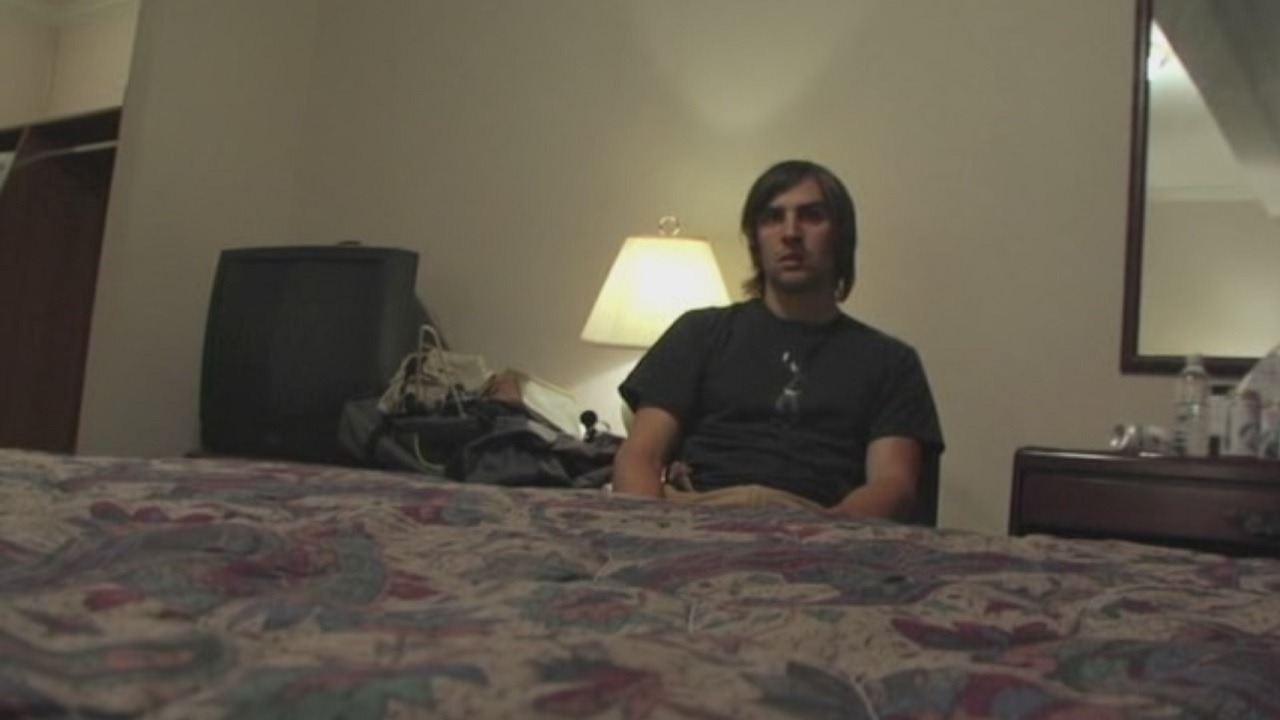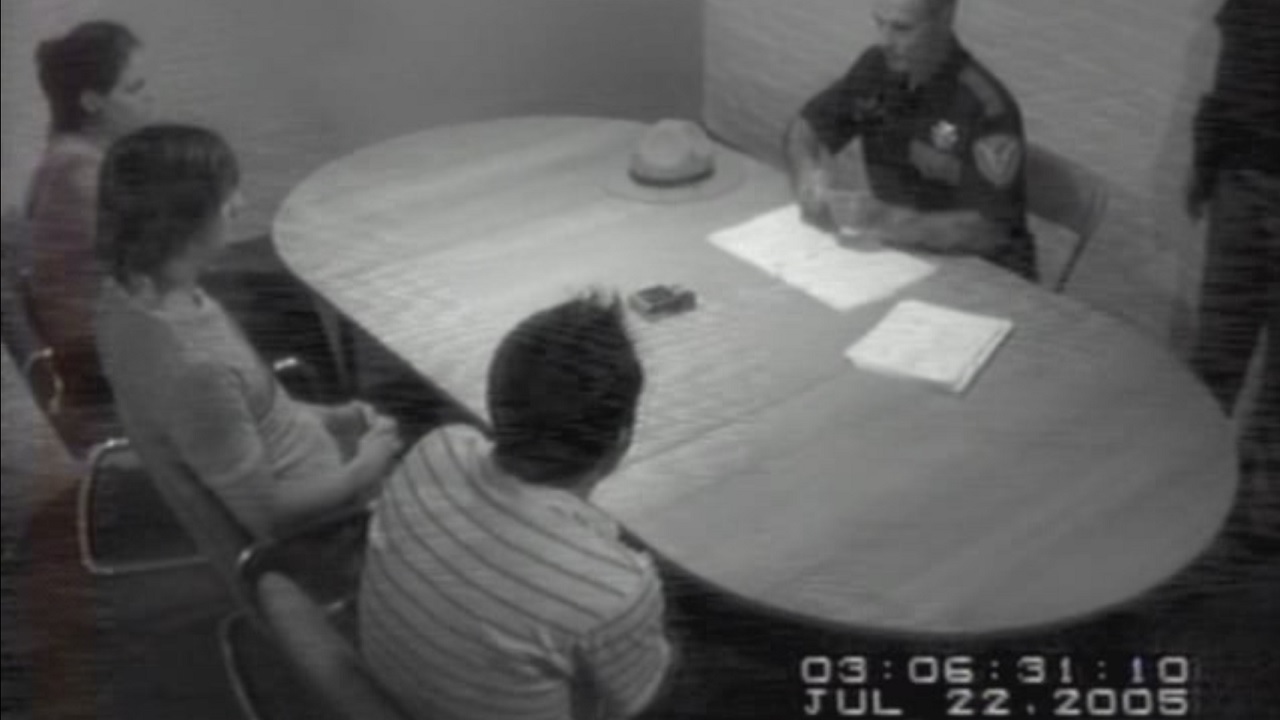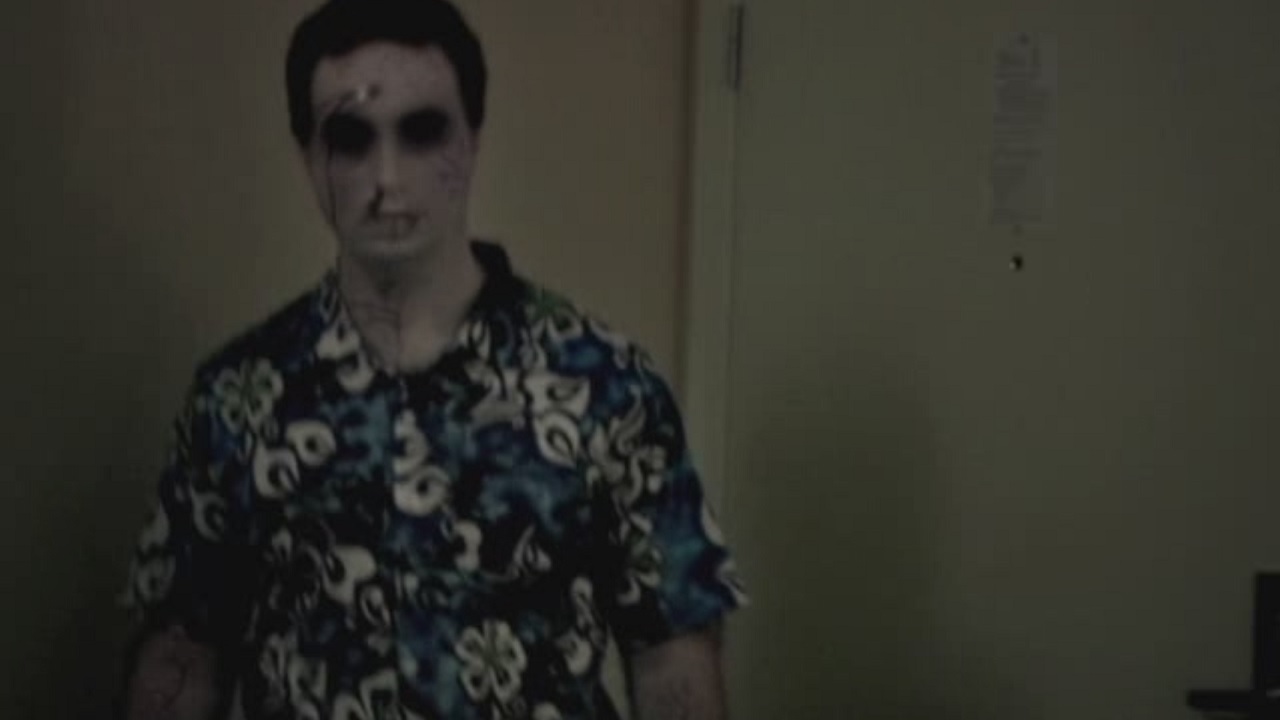 “Skew” is a found footage horror film written and directed by Sevé Schelenz that follows three friends who embark on a road trip to attend a friend’s wedding, and discover that their video camera has supernatural properties – the video camera can predict someone’s death.
“Skew” is a found footage horror film written and directed by Sevé Schelenz that follows three friends who embark on a road trip to attend a friend’s wedding, and discover that their video camera has supernatural properties – the video camera can predict someone’s death.
The film opens with the three main protagonists Simon (Rob Scattergood), Eva (Amber Lewis) and Rich (Richard Harrison) embarking on their journey and Simon bringing along a new video camera he just purchased. Their trip starts well enough until about thirteen minutes into the film. Simon continues to record while the group checks into a motel after their first day of driving, noticing that the motel clerk’s face is distorted when viewed through his video camera. Several hours later the clerk is shot and killed. This horrific event shakes up the three friends, but they continue on their adventure.
Later on, the group drives past a group of tourists on the side of the road photographing a live deer. Similar to the motel clerk, the tourists’ faces are distorted when viewed through Simon’s video camera. Simon subsequently sees a newspaper article about a fatal accident involving the same van of tourists. He comes to realize that whenever someone face looks distorted through his video camera, they end up dead a short time later.
Simon tries to explain this strange phenomenon to Eva and Rich, but they remain skeptical for most of the film. From here the story picks up the pace and Simon’s video camera makes revelations that will change the groups’ lives forever. The concept of an device that can foretell who will die isn’t anything new, but Skew puts a new spin on this interesting plot device.
Acting and Plot
The acting in Skew is not Oscar worthy, but but cast gets the job done. These actors are believable and relatable, and the character development and story are solid. One drawback is that the film often gets bogged down with too much dialog. These dialog-laden scenes seem to exist for the sole purpose of character development, but they come at the expense slowing down the pacing of the film. One of my found footage peeves is bickering between the main characters, and Skew has its fair share of this trope – too much dialog is devoted to having Eva and Rich berate Simon for constantly filming everything.
Skew maintains a creeping dread and anticipation that continues throughout the film which is very effective. The film also includes a number of wonderfully effective jump scares. It’s not as if the audience is constantly anticipating a jump scare, so when one does happen, it’s great.
Skew is thought provoking and evokes several questions. For instance, is the video camera causing certain people to die? Or is the video camera simply revealing those who will soon meet their demise? Or is there a causal relationship between the combination of Simon and the video camera? Is Simon the only one who is seeing the distorted faces? These are only a few of the many questions raised by Skew.
Found Footage Cinematography
The director (Sevé Schelenz) chose to have the actor who plays Simon (Rob Scattergood) operate the video camera instead of hiring a cinematographer to shoot everything. This adds to the authentic feel of the film. Also of note, Simon is never in front of the video camera which creates the dilemma of how the audience will relate to this unseen character. Sevé Schelenz brilliantly uses Simon’s video camera work and dialog to provide insight into what’s going on inside the head of this mysterious character. Simon is not the most likable protagonist in this film, for example, at one point he puts the moves on Eva (who is dating Rich). Other times he is voyeuristic, filming Eva sleeping in her hotel room.
The special effects in Skew are minimal , but effective without being over the top. The blurry, distorted faces that Simon sees are an undeniably creepy effect, especially when their meaning is realized.
Filming Reason
The premise of filming a road trip with friends is believable in and of itself. Simon’s revelations about what he sees through this video camera further bolster the filming reason, providing rock-solid plausibility for his obsessive recording of everything that transpires. Furthermore, Simon explains that his parents never took photos of him while growing up, creating a missing a connection to his childhood. Now that he has a video camera, Simon can film everything and create new memories to fill this gap. He wants to have the camera running all the time because in his words, he never knows when he’s going to get, “that gem of a shot.”
Found Footage Purity
Due to the way this film is constructed, the found footage purity of Skew is fairly low. During scenes where Simon rewinds the tape to view earlier footage, we (the audience) see the rewind, something that obviously does not record to video. Other scenes include things that only Simon sees while looking through the video camera viewfinder, but are not visible on the tape when viewed by his friends – again, this is something that is not recorded to video. In this sense the footage that makes up Skew is really from the POV of the video camera itself as well as what Simon sees looking through the video camera. A similar approach is used in the found footage film Nightlight (2015), in which is filmed from the POV of a flashlight. If the tapes in Skew were actually viewed, the found footage would not contain any supernatural elements.
We can’t fault Skew for taking this unique cinematographic approach, as this is clearly the creative direction intended for the film. Films like Skew, Nightlight (2015), and Preternatural (2015) create a scoring conundrum, as these creative works each employ their own unique artistic interpretation of found footage, and in doing so break many of the rules expected of the genre. Nonetheless, the found footage purity for Skew, a purely objective rating, must take a hit as the film deviates from the cinematographic norms of the genre. While the found footage purity score suffers because of this, the score is not penalized to the extent of a film that took the more traditional approach and did a poor job at execution – Skew has a clear strategy that is properly implemented according to its own unique set of rules.




